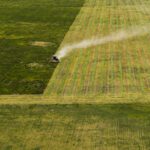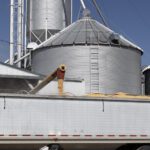Over the next 20 years, ownership of 40% of U.S. agricultural land is expected to change hands.
This gap creates one of agriculture’s biggest challenges: how and to whom you can hand off a farm without losing its value or its legacy.
Changes in land ownership and the farming workforce are unfolding across U.S. agriculture. Among key drivers is the aging population of American farmers and ranchers. Yet many don’t have a clear plan for what happens next.
“Without a plan in place, farms risk being split up, sold off, or left idle — which is a huge loss for families, rural communities, and the future of American agriculture,” says Lance Woodbury, family farm business advisor at Pinion.
“The good news is that there are more options for transitioning your land or agribusiness that you haven’t considered,” adds Woodbury. “You just need to connect with them.”
Enlisting the help of an Ag advisor can reveal opportunities where farmers least expect them, allowing them to protect what they’ve built while opening doors for the next generation.
Identifying the Future Face of Your Farm: 4 Paths for Transition
1. Transitioning a retiring operation to the next generation or a new owner
Retirement is a major milestone, and it deserves careful planning. Over the next decade, many farms will change hands. For some, that means selling outright. For others, it might involve a gradual transfer to provide financial stability and give the new owner time to learn the ropes.
Facilitated conversations are essential to align goals with business realities and avoid surprises during the transition process.
2. Growing through partnership or expansion
Joining forces with another operation or expanding strategically can bring big benefits: more efficiency, stronger buying power, and more resilience through diversification. But partnerships only work when they’re built on clear agreements.
Before moving forward, make sure to:
-
- Structure ownership or entity arrangements carefully.
- Review compliance requirements like FSA rules.
- Run the numbers — mergers and acquisitions need solid financial analysis.
3. Creating space for next-generation leadership
Some farms have a successor ready — but lack the scale required to support them. Growth, diversification, or operational pairing can help create a more viable path for future leaders. By building an operation that offers multiple income streams, shared labor resources, and greater efficiency, families can make the business more appealing and sustainable for future leaders.
4. Opening doors for new or young producers
Transitions aren’t just about retiring farmers. They can also create opportunities for new producers who struggle to access land, capital, or equipment. Connecting these farmers with retiring operators or farms looking to expand can provide a structured, lower-risk way to start.
This approach benefits both sides: new farmers get a foothold in the industry, and retiring operators know their work will continue with purpose.
Getting Started: Your Transition, Your Way
Regardless of which path you pursue — retirement, expansion, or welcoming new talent — proactive planning is essential.
“Don’t let the process intimidate you. A professional advisor that specializes in transition and estate planning will walk you through it step by step,” advises Woodbury.
“And you don’t need to have the important decisions made and questions answered — that’s why it’s called a process.”
An Advisor Will Help You:
- Establish a succession plan and transition timeline
- Evaluate ways to minimize estate tax liability
- Conduct a business valuation to guide fair negotiations
- Perform a “health check” with a tool like Pinion’s SnapShot which benchmarks your operation’s performance against peers
- Assess compatibility and alignment with transition opportunities
- Structure entities to support joint ownership or partnership
- Review FSA compliance and other regulatory considerations
- Conduct financial analysis to evaluate merger or acquisition opportunities
With the right planning, structure, and communication, retiring farmers can protect their life’s work — while current and future producers find new ways to grow.
Pinion Can Help
Every farm transition is unique, shaped by family goals, financial realities, and the legacy you want to leave behind. Pinion advisors work alongside you to guide conversations, evaluate transition opportunities, minimize tax implications, and structure partnerships that protect your legacy and future growth.
“If experience has taught us anything, it’s that owners who plan ahead have more time and ability to find the right opportunity, manage risks, maximize assets, increase equity, and decrease the tax burden of their business,” adds Woodbury.
Ready to talk about your farm’s next chapter and what the future face of your farm looks like? Contact Jeff Johnson, Pinion Ag advisor, at 913-643-5045 or jeff.johnson@pinionglobal.com.








